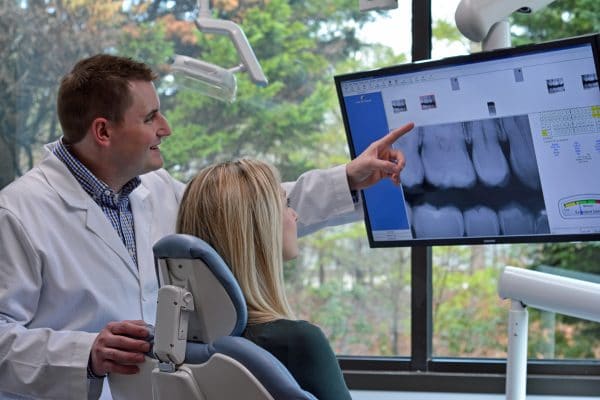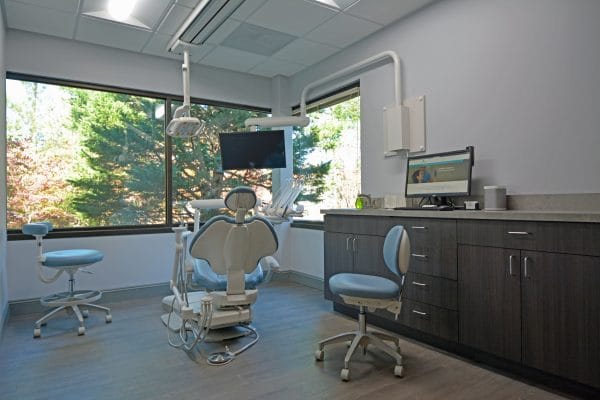Mouth Guards & Night Guards Chapel Hill
fall in love with your smile
Mouth Guards & Night Guards for Oral Health & Protection
Mouth Guards and Night Guards are dental appliances that can be recommended for a variety of oral health issues, the most common being for patients who are suffering with TMJ/TMD or Bruxism (teeth grinding). Mouth guards (which are also suggested for patients who engage in sports or intense physical activity regularly) tend to be more affordable and do not require a prescription. Night guards are made in a laboratory and are custom designed for your unique bite and mouth.
Both mouth guards and night guards are effective methods for preventing damage to your jaw, teeth, and overall oral health. Many patients also report common symptoms associated with TMJ/TMD or Bruxism fading using mouth guards or night guards, such as headaches, chronic jaw pain, and a general feeling of restlessness caused by disrupted sleep.
Mouth guards or night guards can be a wonderful option for patients who are suffering from TMJ/TMD or Bruxism or for patients who engage in regular physical activity. If you would like to learn more about mouth guards and nights guards, please read below, or contact our staff who will be happy to answer any of your questions and/or set up a consultation.
More on TMJ/TMD
TMJ/TMD and Bruxism refer to oral health ailments that can develop in the jaw and face that are typically characterized by headaches, pain in the jaw, or other teeth grinding. If left untreated, these disorders can result in serious damage occurring in the jawbone and surrounding teeth, and can even damage your hearing.
TMJ (temporomandibular joint) connects the temporal bones of the skull to the jaw and is responsible for the jaw being able to move side to side and up and down. When this jaw joint becomes injured or inflamed, symptoms can range from pain, headaches, numbness in the fingertips and face, ringing in the ears, or a jaw that becomes locked or difficult to open.
TMJ disorders are typically classified into the following three categories:
- Myogenous TMJ problems: Most common type of TMD, Myogenous TMJ disorders involve muscle related pain and present as discomfort in the temple, jaw, shoulders, or neck. Often treated with Nightguards and BOTOX® treatment.
- Jaw joint generated pain: Pain caused by internal derangement of TMJ, which can result due to injury to the condyles, displaced disc within the TMJ, or a dislocated jaw
- Degenerative joint disease: Caused by other issues such as rheumatoid arthritis or osteoarthritis
The exact cause of TMJ/TMD is unknown, but several potential contributing factors include:
- Arthritis
- Bruxism
- Dislocation of the Cushioning Disc
- Genetic predisposition
- Injury
- Stress
More on Bruxism
Bruxism is a condition that is characterized by clenching, gnashing, or grinding your teeth. Bruxism can occur while awake or while sleeping. Patients who have sleep bruxism commonly have related issues such as sleep apnea or snoring.
Common signs of bruxism include the following:
- Headaches
- Hearing Loss
- Fractures or Loose Teeth
- Jaw Pain
- TMJ/TMD
- Worn Teeth
Good Candidates for Night Guards
If you have been experiencing any of the aforementioned issues, contact our office today to see if mouth guards or night guards are right for you. While it may be tempting to order a guard online, the best approach for treating your TMJ/TMD or Bruxism is having a guard that is customized to your jaw, teeth and addresses your needs.
Proper Maintenance
It is important to perform regular cleanings of your mouth guard or night guard every night. Prior to handling your guard, always wash your hands. Once your hands are cleaned and dried, you should rinse the guard immediately and then brush the guard using toothpaste and a soft bristle toothbrush. Once properly cleaned, place the guard on a clean surface and allow it to dry. This typically takes 15 to 30 minutes. Once dried, store your guard in a proper case and preferably not in the bathroom, where it is more likely to warp due to humidity. It is also important to avoid sugary foods or beverages or smoking while wearing your guards.
If you follow these best practices, your guards should last you a long time; however, it is important to be aware that eventually your guard will need to be replaced. Be sure to bring your guard with you to your dental appointments so your guard can be inspected for any significant signs of wear and make sure that it is still fitting properly.





High-Quality Dental Care
At Cornerstone Family Dentistry in Chapel Hill, all our services are performed with the patient in mind. We want you to feel comfortable in the dental chair, confident in our work, and most importantly, we want you to fall in love with your smile again. If you would like to schedule an appointment or if you have any questions about cosmetic procedures that we offer, please contact us at (919) 595-1010.
